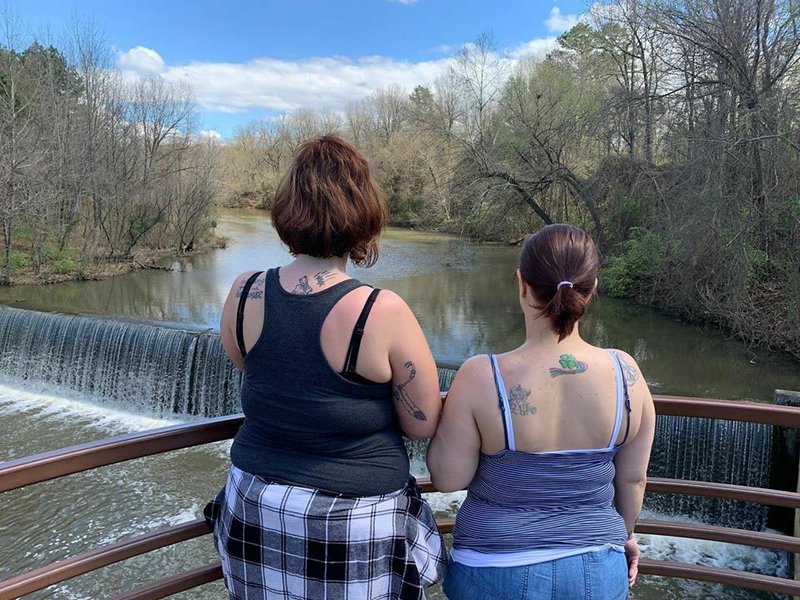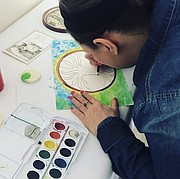With the odds stacked against them, eight women in Fayetteville are determined to stay sober in the middle of a life-altering pandemic.
When dealing with the coronavirus, leaving the house to get toilet paper may be the most serious of some Arkansans' concerns. But to the eight women living at Magdalene Serenity House, confinement and instability can bring back the all-too-familiar feelings of drug addiction and imprisonment. For some of these women, living at the house is how they are staying sober while covid-19 has stacked the deck against them.
"I feel like we're a family here," said Raegin Hardin, a resident at Magdalene Serenity House. "I think being there emotionally and mentally for each other has really helped a lot. I mean, if I was alone in a house right now, I probably would have been having using thoughts. I would've already gotten high if I wasn't here."
Magdalene Serenity House is a transitional home in Fayetteville that serves women who have endured trauma, sexual exploitation, addiction and incarceration. Until the coronavirus outbreak, women had access to interns, family visits and volunteers who were able to drive them to various appointments. Now, residents meet solely with staff and can only leave the house for work, according to April Bachrodt, executive director.
With more federal and state restrictions come fewer ways to accomplish goals some of the women have set, like purchasing a car or mending family ties. Feeling stagnant and stressed is when people begin to regress in their recovery, Bachrodt said.
"For them, confinement is huge," she said. "Most of them have lived lives of chaos, uncertainty and confinement most of their lives, so when your freedom and your choice are being taken away and you're feeling confined, all of those old emotions are coming up for them."
Nichole Ashley is one resident at the house who said she has recently had to fight the urge to use drugs again. After the restaurant she worked at temporarily closed, her mind drifted to old habits, but her determination to stay sober prevailed.
"I would love to say that it hasn't caused using thoughts for me, because it has," Ashley said. "I wouldn't use, but just the thoughts to make the day easier or go by faster were there. I know the answers. The thoughts are there, but the answer is clear to me that using wouldn't make any of it better."
Days after being laid off, Ashley had yet another setback. She said for the first time in years she planned to attend her son's birthday party -- until the coronavirus caused the Arkansas Department of Corrections to put travel restrictions in place. In order for her to attend her son's birthday party, she needed to travel to a different county, but she couldn't get the request granted.
"Travel passes right now for all movement of offenders, whether they're inside or outside prison, is restricted," said Dina Tyler, director of communications for the Arkansas Department of Corrections.
When the parole office denied Ashley's travel request, she said she felt the control of her life she had worked hard to regain was slipping through her fingers.
"The troublesome thing for me on that was the fact that I had made a choice for years -- because I sold drugs and all that -- to not go to his birthday party," she said. "And I had to call and tell him I couldn't go to his birthday party because of something that was out of my control."
For resident Raegin Hardin, faith-based meetings and visits with her son are parts of her recovery that are temporarily suspended. But the effects of the coronavirus have caused her to feel more gratitude for what she can control in her life, she said.
"I guess it's kind of a good thing because it's forcing me to be alone with God, if I make the choice to do that," Hardin said. "It's making me appreciate the things in life that I took for granted for so long."
During the pandemic, the Magdalene Serenity House staff has been working hard to find ways to provide the women feelings of pride and accomplishment, Bachrodt said. That means doing crafts, going on bike rides and having meetings where the residents can express what they're feeling.
"Take it moment by moment; feel how you feel," she tells the women. "I'm acknowledging that this is hard, and it is going to bring up a lot of things that maybe you haven't felt in a while, and all I want to do is be here to support you and walk with you through that."
Having these check-ins and support from others in the house is what is allowing residents like Ashley to survive the pandemic sober and more grateful, she said.
"I've learned how to control a lot of things inside of me that I didn't even realize were a part of me," Ashley said. "And a lot of times when you don't honor the bad parts of you, you don't appreciate every bit of yourself. Since I've learned how to appreciate the bad parts of myself, it's been really freeing, and I think that's been the biggest part of my progress here."
Providing this care and support is the staff's priority, Bachrodt said. In a situation where no one seems to have control, finding creative ways to help the women successfully reintegrate into the community is important now more than ever.
"It's been challenging, but we're trying to stay focused on our mission, and that's caring for our residents," she said. "As long as I'm able to do that each and every day to the best of my ability, I just have to count that as a win."
NAN Our Town on 04/16/2020




